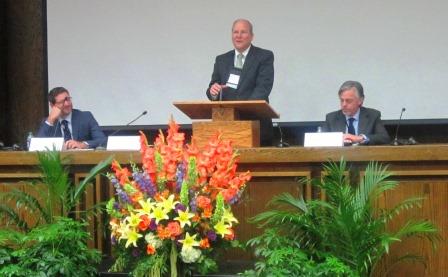





Reported by Roman Harper
This session, moderated by James A. Toronto, involved presentations by Andrea Pin, a professor at the University of Padova, Italy and Michael Casey, private secretary to the Catholic Archdiocese of Sydney, Australia.
Mr. Casey presented on work that he is doing regarding "pathologies of religion and reason." His basic premise, which he highlighted with several examples, is that either religion or reason can "become strange creatures when separated from each other." One very poignant example shared was the current trend of recasting reasoned opposition in certain controversies as simple intolerance. This pretends to make certain groups lose a debate without truly evaluating the merits of the arguments made.
Mr. Pin discussed the current requirement that religious laws be translated into secular terms for the judicial system. He described the problems this creates for religion when certain arguments cannot be effectively "translated" into secular terms. Essentially, when such a translation is required and cannot be provided, the party relying on religious law automatically loses the debate. The ultimate conclusion, requiring sufficient explanation of religious law is an acceptable burden, but demanding a secular translation is too burdensome and subjective and should thus not be required.
